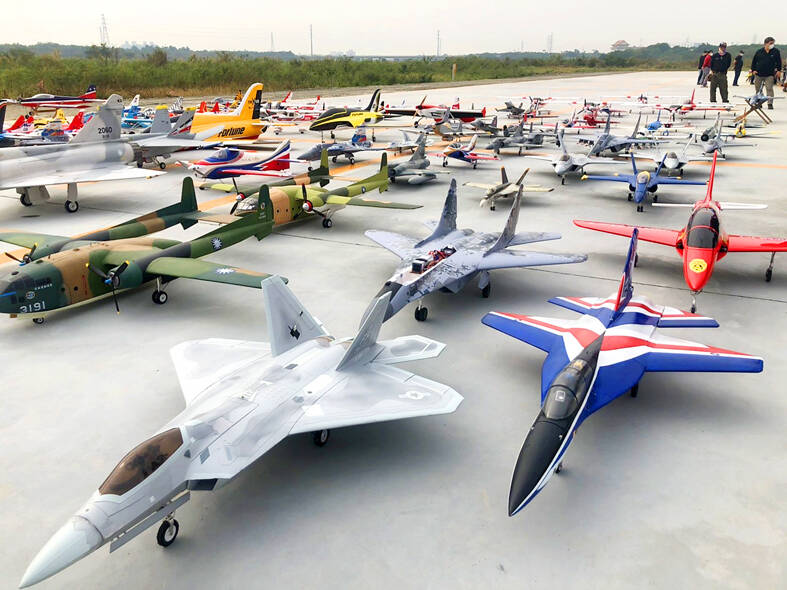The Executive Yuan plans to tighten cybersecurity regulations governing civilian drones, including a mandate for comprehensive testing of all commercially available models, an official said yesterday on condition of anonymity.
Former premier Su Tseng-chang (蘇貞昌) asked the Cabinet to produce new regulations targeting privately owned drones following reports that some Chinese-made systems were utilized during Double Ten National Day performances last year, the person said.
The rules being considered would require all drones sold on the commercial market to obtain cybersecurity certificates, and would ban the use of uncertified uncrewed aerial vehicles (UAVs), the official said.

Photo: Lo Hsin-chen, Taipei Times
The use of uncertified drones could become punishable by a fine of up to NT$1.5 million (US$49,774) under the Civil Aviation Act (民用航空法), the person said.
Taiwan has 40,000 privately owned UAVs, including 30,000 drones registered to individuals and 10,000 to commercial entities, foundations and groups, the official said.
Chinese-made UAVs are banned for official use in Taiwan, but no restrictions are placed on private use, other than a safety rules limiting their weight and flight range.
The scheme being designed aims to regulate the private ownership and utilization of drones by establishing comprehensive standards for cybersecurity, flight safety, license verification, radio signal broadcast authorization and background checks on the users, the person said.
The certification system would be jointly managed by the Ministry of Digital Affairs, the Ministry of Economic Affairs, the National Communications Commission and the Civil Aviation Administration, which is tasked with creating and managing a drone database, the official said.
The aviation authority is expected to hold a public forum to discuss the matter within the next few weeks, then unveil regulatory amendments next month and have them promulgated in April, the person said.
Meanwhile, the Ministry of Digital Affairs plans to open a drone cybersecurity inspection facility on March 1 to test the estimated 1,000 types of drones being used in Taiwan before the year’s end, the official said.
The ministry plans to introduce restrictions on privately owned UAVs to protect public safety, national secrets at sensitive sites, air traffic and the security of officials, the person said, adding that a sunset clause would protect existing drones that do not meet the proposed new standards.

DAREDEVIL: Honnold said it had always been a dream of his to climb Taipei 101, while a Netflix producer said the skyscraper was ‘a real icon of this country’ US climber Alex Honnold yesterday took on Taiwan’s tallest building, becoming the first person to scale Taipei 101 without a rope, harness or safety net. Hundreds of spectators gathered at the base of the 101-story skyscraper to watch Honnold, 40, embark on his daredevil feat, which was also broadcast live on Netflix. Dressed in a red T-shirt and yellow custom-made climbing shoes, Honnold swiftly moved up the southeast face of the glass and steel building. At one point, he stepped onto a platform midway up to wave down at fans and onlookers who were taking photos. People watching from inside

A Vietnamese migrant worker yesterday won NT$12 million (US$379,627) on a Lunar New Year scratch card in Kaohsiung as part of Taiwan Lottery Co’s (台灣彩券) “NT$12 Million Grand Fortune” (1200萬大吉利) game. The man was the first top-prize winner of the new game launched on Jan. 6 to mark the Lunar New Year. Three Vietnamese migrant workers visited a Taiwan Lottery shop on Xinyue Street in Kaohsiung’s Gangshan District (崗山), a store representative said. The player bought multiple tickets and, after winning nothing, held the final lottery ticket in one hand and rubbed the store’s statue of the Maitreya Buddha’s belly with the other,

‘NATO-PLUS’: ‘Our strategic partners in the Indo-Pacific are facing increasing aggression by the Chinese Communist Party,’ US Representative Rob Wittman said The US House of Representatives on Monday released its version of the Consolidated Appropriations Act, which includes US$1.15 billion to support security cooperation with Taiwan. The omnibus act, covering US$1.2 trillion of spending, allocates US$1 billion for the Taiwan Security Cooperation Initiative, as well as US$150 million for the replacement of defense articles and reimbursement of defense services provided to Taiwan. The fund allocations were based on the US National Defense Authorization Act for fiscal 2026 that was passed by the US Congress last month and authorized up to US$1 billion to the US Defense Security Cooperation Agency in support of the

‘COMMITTED TO DETERRENCE’: Washington would stand by its allies, but it can only help as much as countries help themselves, Raymond Greene said The US is committed to deterrence in the first island chain, but it should not bear the burden alone, as “freedom is not free,” American Institute in Taiwan Director Raymond Greene said in a speech at the Institute for National Defense and Security Research’s “Strengthening Resilience: Defense as the Engine of Development” seminar in Taipei yesterday. In the speech, titled “Investing Together and a Secure and Prosperous Future,” Greene highlighted the contributions of US President Donald Trump’s administration to Taiwan’s defense efforts, including the establishment of supply chains for drones and autonomous systems, offers of security assistance and the expansion of